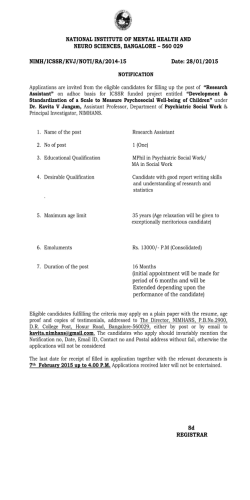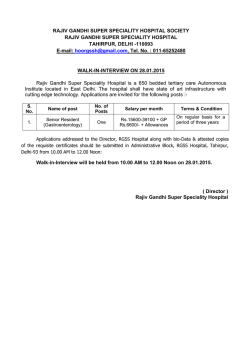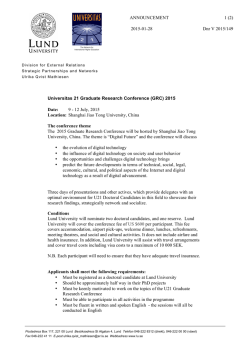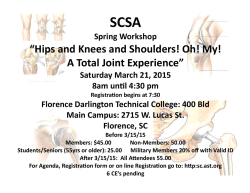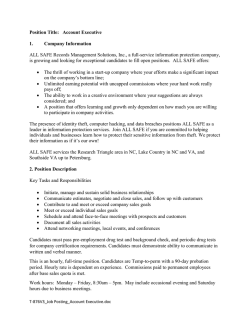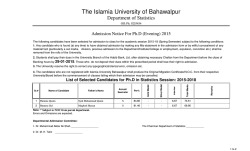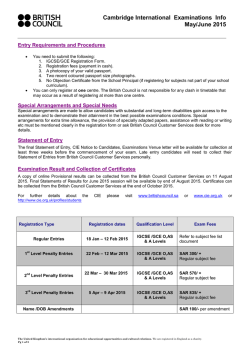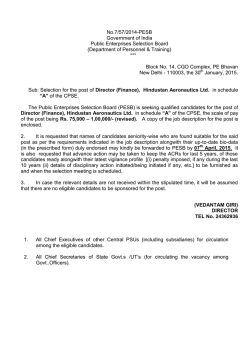
FLORENCE UNIVERSITY OF THE ARTS (FUA) OFFICE OF
FLORENCE UNIVERSITY OF THE ARTS (FUA) OFFICE OF REASEARCH, ASSESSMENT AND DEVELOPMENT (ORAD) CALL FOR PROPOSALS Research is the crossroads where the knowledge of today encounters the potential to shape future practices. Florence University of the Arts sustains the development of new ideas that positively impact the global landscape. As an academic institution, FUA believes in the importance of research conducted in parallel with classroom instruction for the reciprocal learning advantage of the campus and greater communities. Through its research initiative, FUA seeks contributions from Italian and international academic communities. Submitted proposals are evaluated by the selection committee according to relevance and applicability to current and future contexts. Research projects are headquartered within FUA facilities in the center of Florence, Italy, and coordinated by the institution’s Research, Assessment and Development department. 1. The research areas for which to submit the proposals are as follows: A. Hospitality & Tourism Hospitality is an integral part of FUA’s educational offering and covers a wide range of topics including: hospitality business management, professional group management, motivational practices and coaching, nutrition, food operations and processes, and international marketing for the hospitality industry. B. Arts Arts are intended both as Fine Arts and Digital Arts, with a focus on the new technologies that are applied to the study and management of the arts. Please note: FUA is also seeking specific proposals based on the architectural and artistic history of its main campus located in Palazzo Bombicci Pontelli Guicciardini Strozzi (Corso Tintori 19/21, Firenze). C. Educational Innovation (Experiential Learning – Field Learning) C.1 Experiential Learning is an educational model in which students, in addition to regular class hours, are involved in ''learning by doing" practices through integrated projects with the local population and territory. The aim is to remove cultural barriers and obsolete learning methodologies associated with static educational models. The experiential learning goal is to develop skills and qualities that will concretely aid the student in his or her professional career. Experiential learning hours are always supervised by the instructor, who guides the students step-by-step in their educational route while providing guidance and support. This model allows students to benefit from an educational experience that is based on theory and practice and fosters the development of skills related to problem-solving, leadership, and management. C.2 Field Learning is one of the fundamental values of the FUA mission and is defined as a teaching method linked to learning through direct experience in the field. Skills, knowledge and experience are acquired outside of the traditional academic context through activities, which may include trips, field research, and service learning projects. Field learning has a cultural profile due to activities that are wide-ranging and related to the territory. Furthermore, field learning is not limited to the subject matter of the course but aims to enrich the academic subjects through an extensive and deeper approach. Students have the opportunity to integrate theory and practice while experiencing culture, art, and local communities. 2. Terms and conditions for the grant Applications will not be considered for candidates who do not fulfill grant requirements or do not adhere to application instructions. Who may apply? Applicants for FUA grants may be individual researchers or groups of researchers. Candidates must hold a PhD or a doctoral degree according to the laws of the country of degree fulfillment. The doctoral degree must have been awarded no later than the closing date for applications in this call. The doctoral degree will be considered awarded when all degree requirements have been completed (i.e. compulsory courses, oral public defense/dissertation, and approved doctoral thesis). 3. Grant period A FUA research grant is awarded for a maximum of eight months in the 2015 calendar year. The grant period commences from the date in which the selection committee formally announces the research appointment to the final candidate. 4. Costs and grant amount The grant can be used to cover any type of project-related costs such as salaries (including personal salaries, corresponding to the level of project activity), travel (including visits and lodgings at research facilities), etc. The grant may not be used for scholarships. If the project involves a doctoral student, funding may not be used as salary compensation during the doctoral student’s teaching period. Grant funding is made available for a maximum of 6.000,00 euro including indirect costs for the eight-month period of research. Grant applications exceeding this sum will not be taken into consideration. 5. Number of grants and applications Candidates may submit one grant application for a single area of research. 6. Instructions for applying 6a. Application content The application must contain the following: • Personal data • Summary • Popular science description • Budget proposal • Research program (Appendix A) • CV (Appendix B) • Publication list (Appendix C) • Budget and research resources (Appendix N) An application that lacks one or more of the mandatory appendices will not be considered. The application must be signed by the candidate before submissions. 6b. Language In order to scientifically evaluate applications, FUA may engage foreign panel reviewers. All materials must be submitted in the English language. Please note that any documentation produced during the research term, including the final research report, must be produced in English. 6c. Fonts and images All application material including appendices is to be submitted in A4 format, 25-mm margin, and a 12-point Calibri or Arial font. If symbols or formulas are utilized, they must be reviewed with a preview function prior to submitting the application. If the application submitted as a hard copy, a 200-300 dpi resolution is recommended for images. PDFs are to be submitted without password protection. The above criteria are also applied to the final research report. 6d. Required personal data: • Family name, other names, nationality, identity card or passport number, date of birth, permanent address, phone or mobile number, e-mail, higher education degrees, required appendices (see below), signature. o E-mail will be the primary form of contact for communication regarding the application. Each candidate is responsible for ensuring that the application is complete. Incomplete applications may be disregarded for evaluation. FUA does not accept additional information submitted after the application deadline with the exception of information expressly requested by the institution. 6e. Summary The summary of the research program must contain a short description of: • The research that the applicant proposes to carry out. • How the research will be conducted and what scientific methods will be utilized • Importance and significance of the planned research. The text should provide a brief description of research purpose and implementation, and employ a writing style that will enable individuals from other research backgrounds to easily comprehend the provided information. Length: maximum ½ page (see point 8). 6f. Popular science description Describes the project in a popular science style for audiences unfamiliar with the topic. The description should include what will be done and why, and explain how the new knowledge is relevant. The popular science description is an important tool for informing a broader audience of research sustained by FUA. Once funding is awarded to the selected candidate, FUA reserves the right to use this description for informational purposes. Length: maximum ½ page (see point 8) 6g. Total budget framework A complete budget framework in Euro currency must be submitted. The budget includes the total sum of project-related costs such as salaries, travel (including stays at research centers), publication costs, minor equipment, and depreciation. The grant may not be used for scholarships. Both direct and indirect project-related costs are to be included. The total grant sum may reach a maximum total of 6.000,00 euro including indirect costs. Sums beyond this amount will not be considered. 6h. Research program (Appendix A) Appendix A should consist of a brief, complete description of the research objective in no more than six A4 pages (see point 8, including references. Please note that any excess pages will not be considered for evaluation) The research program, as well as other appendices, must be written in English. It must include the following information under separate headings: • Purpose and aims: Overall purpose and specific goals of the research project. • Survey of the field: Summary of existing research regarding the chosen field (including the candidate’s own research if applicable) with key references. • Project description: Project summary of theories, methods, timetable, implementation, and project organization. • Significance: Project’s significance to the research area. • Relevance: Brief description of the project’s relevance to the strategic research area. • Preliminary results: List of candidate’s own experiments and pre-studies regarding the research area. The following items can be listed under a separate heading if considered relevant to the candidate’s project: • Equipment: Basic equipment for the project at the disposal of the candidate or group of candidates. • National and international collaborations: Any collaboration and/or cooperation with research groups or associations that candidates may establish through the research. • Ethical considerations: Ethical issues that may occur during the project and how they will be addressed by the research. 6i. CV (Appendix B) No more than two A4 pages per candidate (and per individual in a group). Publications are to be listed separately in Appendix C (see below). Specify the following (non-applicable items can be left blank): 1. Higher education qualification(s): year, subject area, university 2. Doctoral Degree: year, discipline/subject area, university, dissertation title, supervisor. 3. Postdoctoral positions: year and placement. 4. Teaching positions held: year and required qualifications per position. 5. Present position, period of appointment, percentage of research in the position. 6. Previous positions and periods of appointment: indicate the type and periods of employment. 7. Other information that is relevant to your application. 6j. Publication list (Appendix C) List of publications cover the last eight years (for group applications, include lists for each group member). The five publications most relevant to the project are to be indicated by an asterisk (*). Publications must be categorized in the following order: 1. Peer-reviewed original articles 2. Peer-reviewed conference contributions 3. Review articles 4. Books and book chapters 5. Patents (indicate registration date) 6. Open-access computer programs that you have developed 7. Popular science articles/presentations Please note: Candidates should list only articles (or equivalent work) that have been published or accepted for publication. 6k. Budget and research resources (Appendix N) The following items are to presented in a maximum of two A4 pages: • Explanation of the proposed budget • Brief justification of each item in submitted budget • Total research resources to be employed 7. Evaluation, selection, duration Active researchers conduct the scientific evaluation of applications. All evaluation of competing applications is conducted according to FUA criteria. The final selection and placement are subject to the approval of the FUA Academic Senate. FUA will inform the researcher or group of researches of admittance and grant approval. The research period commences from the date of receipt of the official announcement and will last for a total of eight months period for completion. Comments and feedback will be sent to all applicants. 8. Research, final results, scientific report Appointed researchers will conduct research and draft the final scientific report according to FUA criteria. The results of the research must be included in the scientific report according to the following formatting and deadline requirements: • 80 pages. • Submission before midnight (24:00) on the last valid day of the research period (see point 7). The report will be published by FUA through its publishing house. 9. Funding 50% of the provided funds (maximum 3.000,00 euro) will be paid within a month from the official selection announcement (see point 7). The remainder of the grant will be fulfilled upon the presentation of the final report and expiration of the research period. 10. Application submission and deadline All applications must be sent via email to: [email protected] The application deadline expires at midnight (24:00) on February 28th, 2015. Each application will receive a receipt to confirm successful submission, however the confirmation does not verify whether the provided contents are properly aligned to the call criteria. Applicants are responsible for ensuring that submissions are correct and complete. An incomplete application may be disregarded for evaluation. 11. Contacts Dr. Elio Satti Director of Research, Assessment and Development Florence University of the Arts Corso Tintori 21 - 50122 FIRENZE phone: +39 055 033 2952 fax: +39 055 247 6234 email: [email protected] web: www.fua.it/Key-Info/research-at-fua.html
© Copyright 2026
